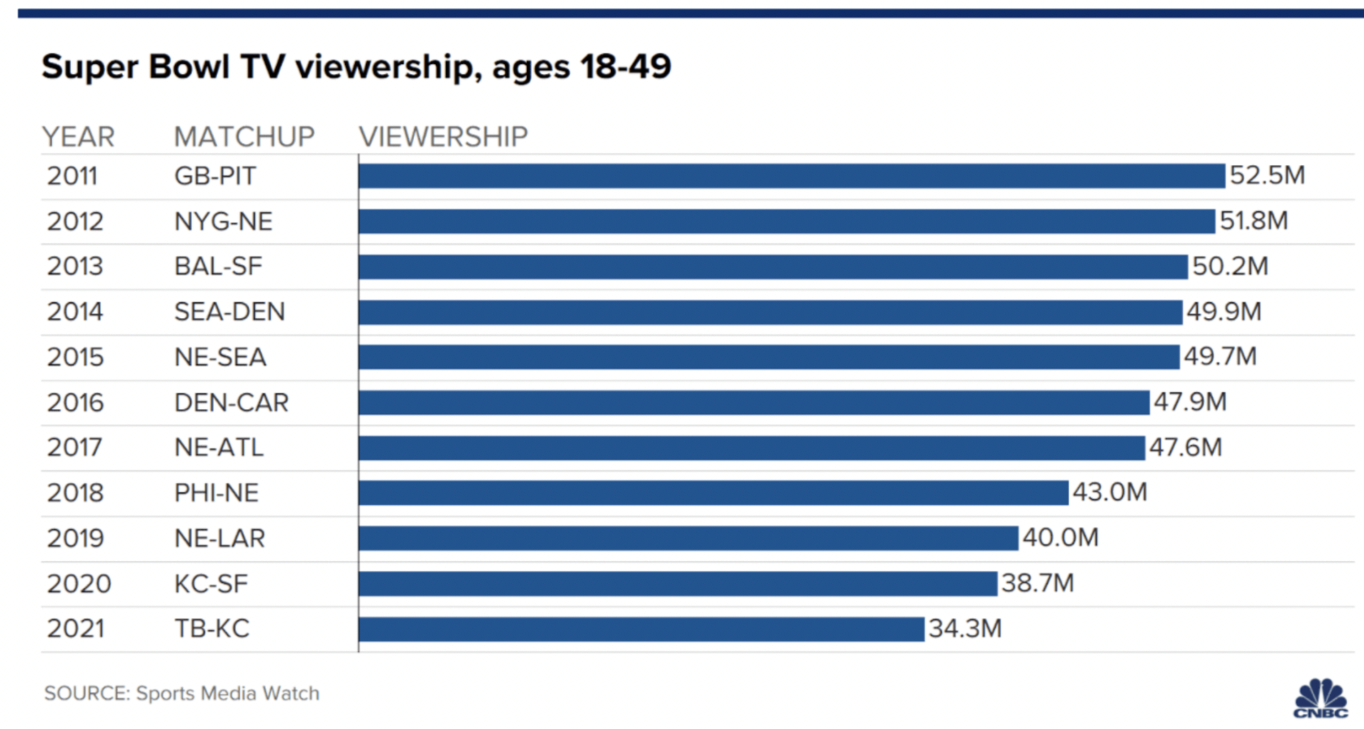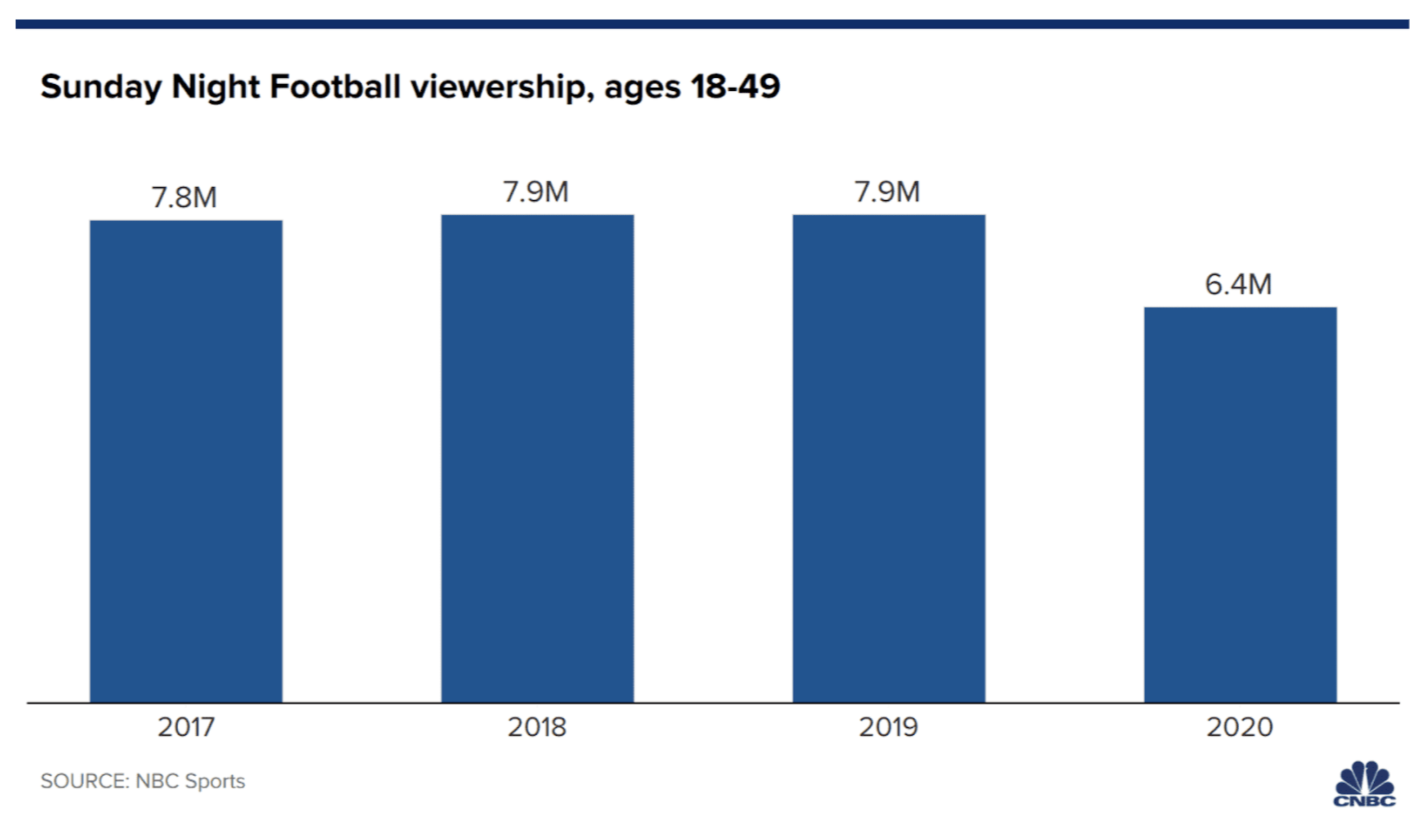Nfl Tv Audience Continues to Decline
While the Super Bowl has managed to remain the most-watched live event of the year, it has not managed to maintain its robust viewership numbers in the age of cord-cutting and media saturation. According to an article from CNBC, the Super Bowl ratings for viewers aged 18 to 49 have decreased every year for the past 10 years - from 52.2 million in 2011 to 34.3 million in 2021. While the decline in viewership could be partially attributed to the rise of streaming, as 5.7 million people streamed the Super Bowl in 2021, the streaming audience is not large enough to fully explain the dwindling interest. The consistent trend could be attributed to the overall decline of live event viewership. The Grammy, Emmy, and Academy Awards ceremonies have all experienced a precipitous decline over the past decade. The Academy Awards went from viewership of over 40 million in 2010 to 10.4 million in 2021.

Super Bowl viewership in the 18-49 demographic has declined over the past ten years. Source: CNBC.
However, football viewership (which is measured by an entire season of games) is a bit more nuanced than one-off award shows. CNBC notes that Sunday Night Football viewership in the 18 to 49-year-old age group has remained relatively steady around 7 million. Given this interest in Sunday Night Football, the issue with Super Bowl viewership seems not to be a general lack of interest in live sports - but less interest from casual viewers tuning in. The rise of and popularity of different forms of entertainment (streaming services, video games, TikTok) means that the Super Bowl cannot rely on the fact that people with nothing to do on a Sunday evening will watch anymore. Since there are myriad ways to entertain oneself on any given Sunday evening, gaining viewers requires pulling attention from other forms of entertainment.

Steady Sunday Night Football viewership from audiences ages 18-49. Source: CNBC.
In addition to an influx of entertainment distractions, the rise of short-form entertainment has decreased younger Americans' attention spans – and Football is a long game. Adding these factors to controversies surrounding players' concussions and the alleged blackballing of Colin Kaepernick, it seems that the NFL is not keeping up with the times.
It is no secret that playing football can lead to concussions, cognitive issues, and even chronic traumatic encephalopathy (CTE), which contributed to premature deaths and neurodegeneration similar to that found in people with Alzheimer's. Many parents take this into account when considering which sports their child should play and it is no wonder, then, that between 2008 and 2018, the total number of children playing tackle football dropped by 620,000. In the same time period, "...season attendance at top-level college [football] games decreased by almost ten percent." The fewer people participate in football at a young age, the less interested they are in watching football as an adult.

Visualization of decline in youth participation in both flag and tackle football. Source: Aspen Project Play
Colin Kaepernick became a national symbol in the fight against police brutality when he took a knee during the national anthem in 2016. At the beginning of 2017, he left his contract with the 49ers and became a free agent, seeking employment with another team. This should not have been that difficult, considering that he was the 17th-best quarterback among starters in the previous season. However, he failed to be picked up by any of the thirty-two NFL teams, which indicates a possibility that the NFL deliberately punished Kapaernick for bringing controversy to the sport. In 2017, Kaepernick filed a grievance against all thirty-two NFL owners, accusing them of collusion which was ultimately settled in 2019 for an undisclosed amount.
While these events can, and should, be taken into account when considering the diminishing viewership, the Super Bowl gives some hope to live televised events. It is, after all, "...still -- by far -- the most-watched event of the year (including among the 18-to-49 demographic)." However, in order to remain the most-watched event of the year, it is obvious some changes must be made. One way in which major sports leagues could accomplish this is making streaming sports content more accessible and less confusing. The NFL has tried this, as its website outlines fourteen different ways to watch NFL games. Although, while the intention is present, the amount of choice only makes the opportunity of streaming more convoluted. Streaming Sunday Night Football requires a subscription to NBC's Peacock, streaming live games broadcast through CBS requires Paramount+, Monday Night Football requires ESPN+, Thursday Night Football can be streamed through Amazon Prime, and games broadcast on FOX still require TV sign-in credentials. NBC's low viewership numbers of the Summer Olympics last year proved that people are not willing to jump through hoops to figure out how to watch televised sports. As streaming becomes the dominant way to watch TV, the NFL will have to find a way to streamline the viewing experience. Otherwise, they will lose out on converting casual viewers, who used to watch just because it was on TV, into fans of the game.
Despite the trend of lower viewership, there is one instance that raises audience interest, but it remains outside of the NFL's direct control: too-close-to-call games. The 2021-2022 season averaged 17.1 million viewers per game, the highest viewership since 2015. In the first five weeks of the season, nineteen games "…were decided with a winning score in either the final minute of regulation or overtime" and twenty-one games were won by three points or fewer. When a game is an apparent blowout, people stop watching, especially casual viewers. Thus, there is the possibility that viewership has decreased simply due to an increase in uninteresting games in the past few years. If there's anything the many close games this past football season, and subsequent increase in viewership, can teach us, it's that viewers enjoy watching competitions that are truly anyone's game.
+ Resources
Blackistone, Kevin B. "The NFL Has Effectively Blackballed Colin Kaepernick." The Washington Post. WP Company, March 23, 2017. https://www.washingtonpost.com/sports/redskins/the-nfl-has-effectively-blackballed-colin-kaepernick/2017/03/23/d0b754d6-0fd1-11e7-ab07-07d9f521f6b5_story.html.
Dubow, Josh. "Close Calls: NFL Has Record Number of Games Decided Late." US News, October 13, 2021. https://www.usnews.com/news/sports/articles/2021-10-13/close-calls-nfl-has-record-number-of-games-decided-late.
Florio, Mike. "The Blatant Blackballing of Colin Kaepernick Continues." ProFootballTalk. NBC Sports, October 10, 2019. https://profootballtalk.nbcsports.com/2019/10/10/the-blatant-blackballing-of-colin-kaepernick-continues/.
Gurwin, Jason. "Super Bowl LV on CBS Sets New Streaming Record with 5.7 Million Average Viewers." The Streamable. The Streamable, February 9, 2021. https://thestreamable.com/news/super-bowl-lv-on-cbs-sets-new-streaming-record-with-5-7-million-average-viewers.
"Kaepernick Files Grievance against NFL, Claiming Collusion." CNBC. CNBC, October 16, 2017. https://www.cnbc.com/2017/10/15/kaepernick-files-grievance-against-nfl-claiming-collusion.html.
Miller, Dr. Michael Craig. "Concussions in Football." Harvard Health. Harvard Medical School, August 15, 2010. https://www.health.harvard.edu/blog/concussions-in-football-20100814260.
"MNF Leads the Way as NFL TV Ratings up 10%." ESPN. ESPN Internet Ventures, January 12, 2022. https://www.espn.com/nfl/story/_/id/33050695/nfl-regular-season-ratings-increase-10-percent-last-season?platform=amp.
"Official Site of the National Football League." NFL.com. NFL. Accessed January 30, 2022. https://www.nfl.com/ways-to-watch/. Oliver, David. "Has COVID Destroyed Our Attention Spans?" Has Covid destroyed our attention spans? USA Today, December 22, 2021. https://www.msn.com/en-us/movies/news/has-covid-destroyed-our-attention-spans/ar-AAS3b21.
Pallotta, Frank. "NBC's Summer Olympics Ratings Are in Free-Fall." CNN. Cable News Network, August 4, 2021. https://www.cnn.com/2021/08/04/media/summer-olympics-ratings-nbc/index.html.
Pielke, Roger. "The Decline of Football Is Real and It's Accelerating." Forbes. Forbes Magazine, December 10, 2021. https://www.forbes.com/sites/rogerpielke/2020/01/28/the-decline-of-football-is-real-and-its-accelerating/?sh=4dd559802f37.
Sherman, Alex. "The Super Bowl Is Losing Viewers under 50, Reflecting How American Media Has Fragmented." CNBC. CNBC, February 13, 2021. https://www.cnbc.com/2021/02/13/why-the-super-bowl-is-losing-the-18-49-demographic.html.
Whitten, Sarah. "Audiences for Award Shows Are in Steep Decline. This Chart Shows How Far Viewership Has Fallen." CNBC. CNBC, May 2, 2021. https://www.cnbc.com/2021/05/02/oscars-2021-nielsen-data-shows-viewers-have-lost-interest-in-award-shows.html.
Witz, Billy. "This Time, Colin Kaepernick Takes a Stand by Kneeling." The New York Times. The New York Times, September 2, 2016. https://www.nytimes.com/2016/09/02/sports/football/colin-kaepernick-kneels-national-anthem-protest.html.
"Youth Sports Facts: Participation Rates." The Aspen Institute Project Play, 2020. https://www.aspenprojectplay.org/youth-sports-facts/participation-rates.
Source: https://amt-lab.org/blog/2022/2/declining-super-bowl-viewership-will-it-maintain-most-watched-event-of-the-year
0 Response to "Nfl Tv Audience Continues to Decline"
Enregistrer un commentaire